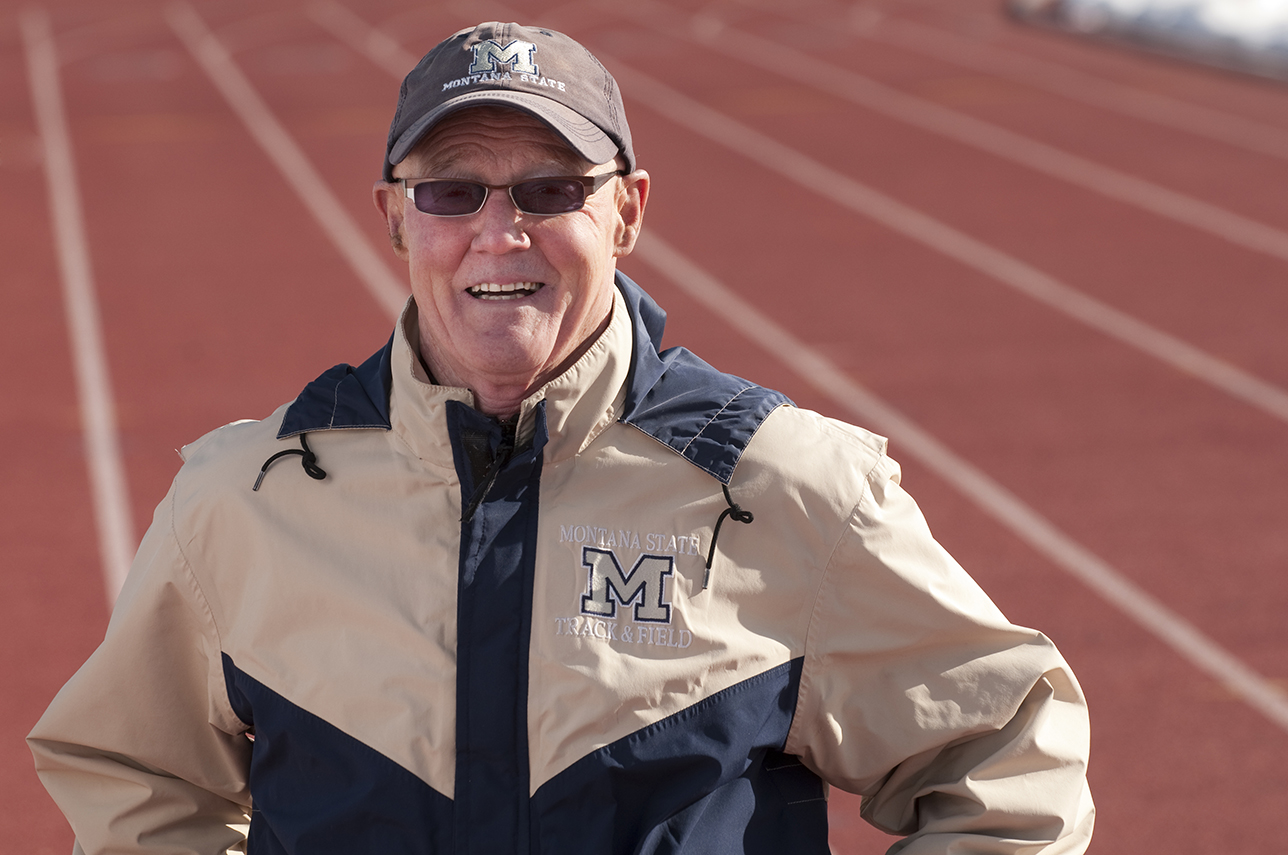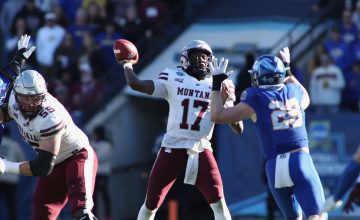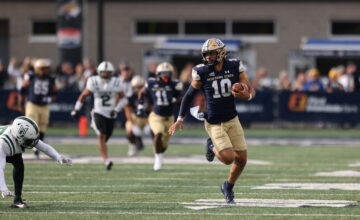BOZEMAN — Mike Carignan remembers when Montana State first acquired its wooden banked indoor track in the early 1990s, a cutting edge surface upgrade for a track program on the rise.
Carignan, Montana State’s esteemed throws coach for 40 years before retiring in 2017, remembers the running surface for more than what it meant to the MSU cross-country and track & field programs at the time. Carignan remembers the track because of the way it revealed Dale Kennedy’s endurance and drive to ensure the Bobcat programs would always thrive.
The coaching staff didn’t really know how to set up the state of the art surface, Carignan remembers. One day before an indoor meet in Bozeman, Carignan remembers Kennedy literally staying up all night setting up the track. The following day, MSU hosted an indoor competition as well as a group of recruits. Carignan remembers Kennedy projecting his trademark energy throughout the meet and to the potential future Bobcats. When the meet ended, Kennedy stayed long afterward to help disassemble the track.
After what Carignan remembers as “close to 40 consecutive hours” with no sleep, Kennedy could still be found in the middle of Brick Breeden Fieldhouse, broom in hand, the last person in the building, making sure the arena was tidy in preparation for his athletes’ next chance to perform.
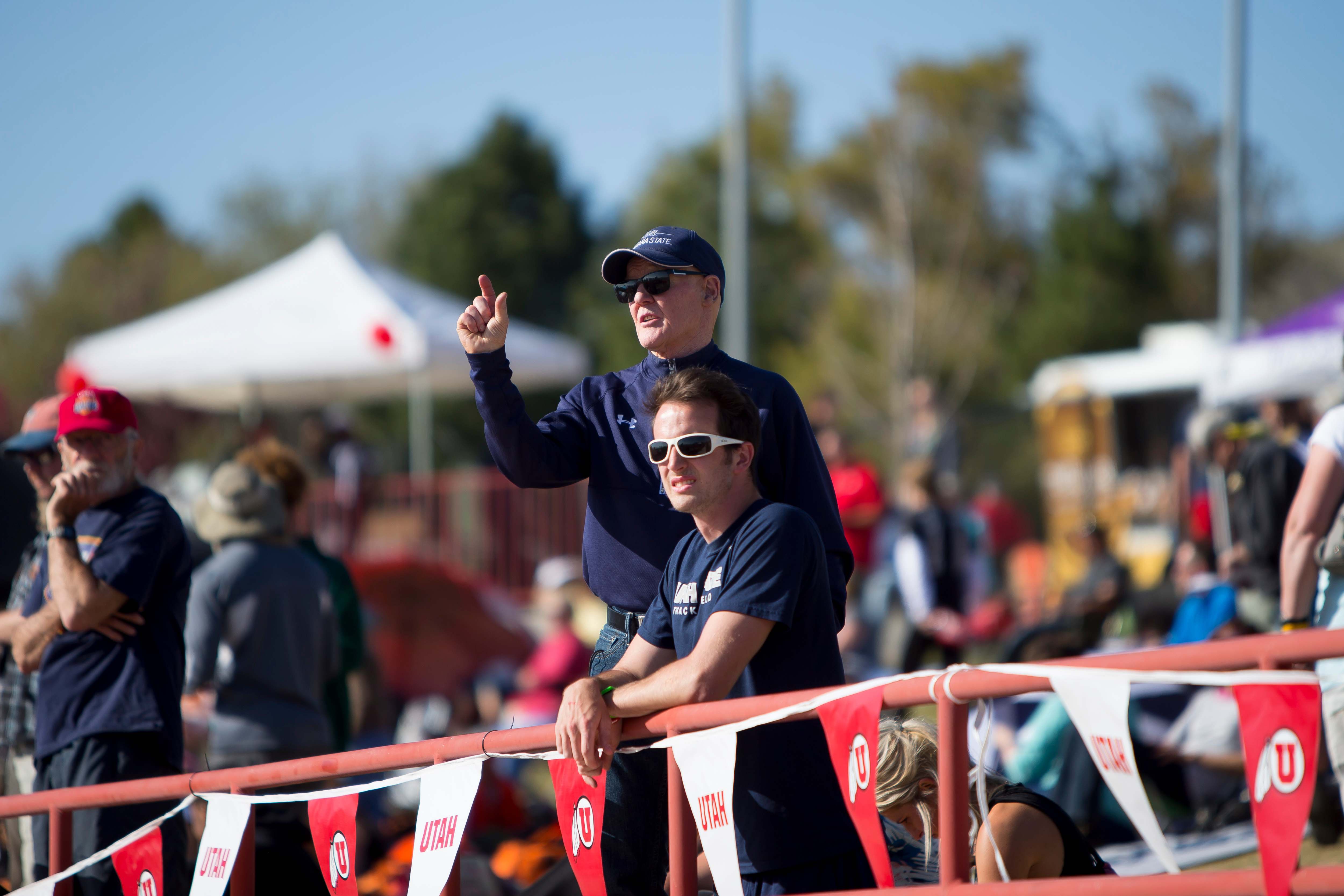
Dale Kennedy/ Courtesy of Mike Carignan, MSU athletics
“He understood that he had to do whatever it takes because of what he always wanted this place to represent,” Carignan said. “And that often meant you have to do it yourself.”
During an unwaveringly consistent career trademarked by his diligent dedication to growing the sport in Southwest Montana, Kennedy secured a place as a pillar in the Bozeman track and field community. On the third Monday in June of 2018, Kennedy announced he will step away. He will coach until the end of his contract in October.
The well-respected, energetic and engaging coach let his outgoing personality and relentless work ethic symbolize his 37 years as one of the pinnacle figures for Montana State athletics. His retirement caps an illustrious career filled with four decades of successes and an influence that went well beyond the Bobcat athletes he coached. Dale Kennedy helped establish the foundation of the running community in Bozeman.
“There’s definitely big shoes to fill,” said Chantel Jaeger, a standout sprinter who earned 11 Big Sky Conference championship meet Top 3 finishes and three Big Sky titles during a career that finished in 2015. “It will be a transition for everyone to adapt to the change because he had so many traditions.
“He was always so educated on the sport so his experience, knowledge and wisdom will be really hard to replace.”
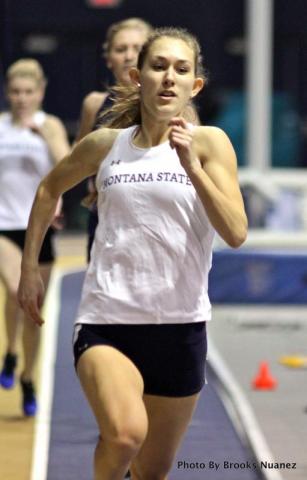 After a handful of successful years coaching at Spokane Community College, Kennedy came to Montana State as the head cross-country coach and women’s track & field coach in 1981. He held the top post for both Bobcat cross-country teams until 2014. In 2000, he took control of the men’s track and field team.
After a handful of successful years coaching at Spokane Community College, Kennedy came to Montana State as the head cross-country coach and women’s track & field coach in 1981. He held the top post for both Bobcat cross-country teams until 2014. In 2000, he took control of the men’s track and field team.
During his nearly four decades at MSU, Kennedy has helped mentor 115 Big Sky champions during the outdoor season and another 92gold medalists during the indoor season. In 1983, Kennedy helped push the women’s indoor track team to the Mountain West Conference crown, the first of nine league championships between cross-country and track in his decorated career.
“But the biggest contribution is the energy and willingness to work with people, meet people. He really likes people,” Carignan said. “He is an extrovert.
“And his dedication to track is second to none. He really loves the sport. When we are on a bus, the rest of us are usually looking for diversion but he’s reading tech manuals on how to train better. He’s the real deal, really dedicated to the sport. He loves it.”
Since assuming the title of director of all six arms of the program 18 years ago, Kennedy’s teams have continued to produce. The 2002 Big Sky champion men’s cross country team finished 11th in the nation. Kennedy still remembers it as “one of my most fun teams to coach.”
Kennedy has helped develop 43 qualifiers for the NCAA championship meet, including 24 that have earned All-American honors. He helped guide Shannon Butler to the men’s national championships in the 10,000 meters in 1990 and the 5,000 in 1991. He oversaw Ellie Rudy winning back-to-back pole vault national titles in 2007 and 2008.
Just days after his retirement, two of his most talented pupils shined on the national stage. Patrick Casey took fourth at the United States Track and Field national championship meet in the 1,500 meters. Fellow former MSU running star Cristian Soratos finished eighth in the same event.
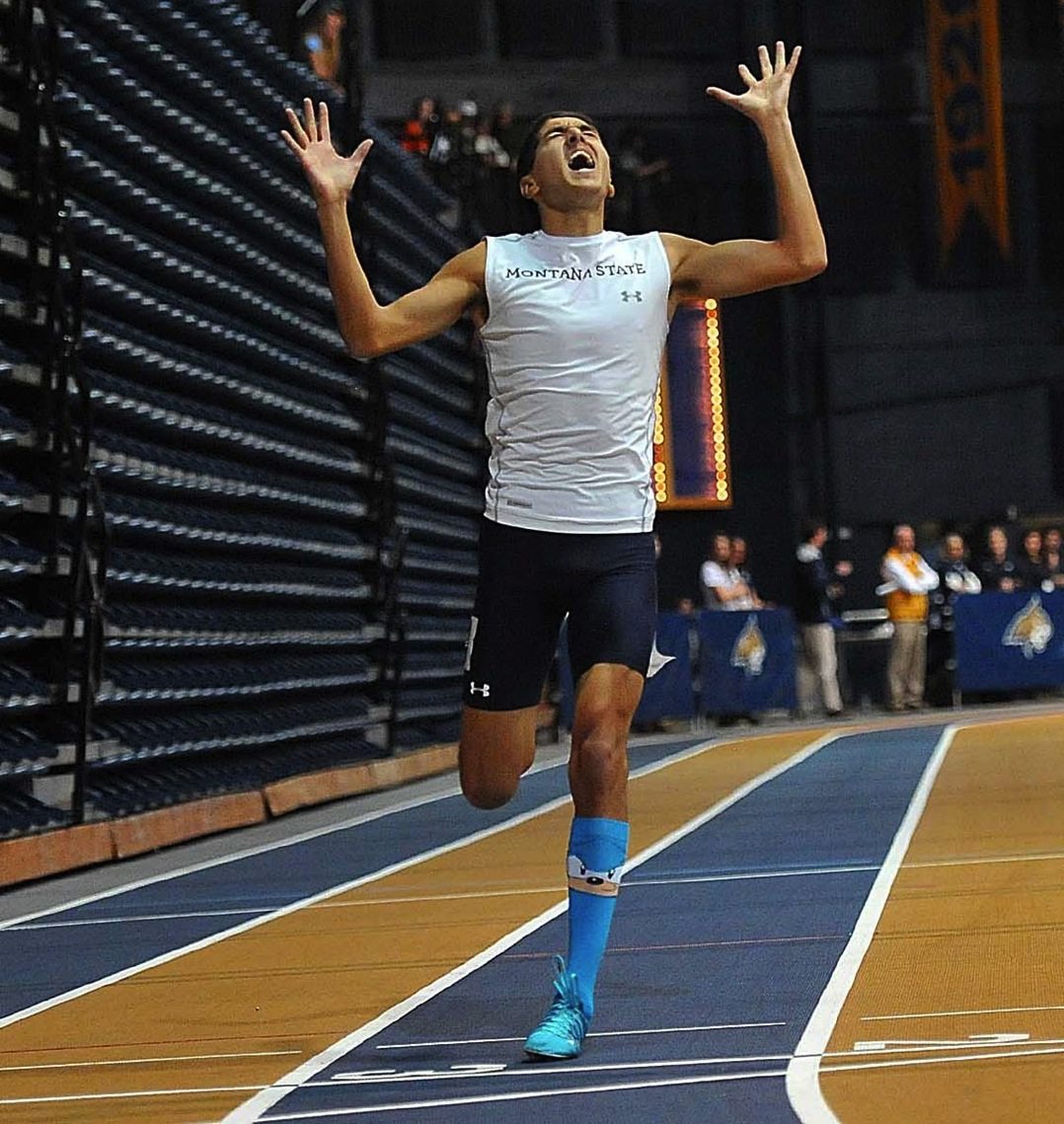
MSU track great Christian Soratos
Close to two-dozen MSU men and 10 women have advanced to the national championship meet at Hayward Field in Eugene, Oregon since 2000. In Kennedy’s last year at the helm, he helped Amanda Jaynes (400m hurdles) and Kyle Douglass (discus) qualify during the outdoor season while playing a role in Diego Leon’s indoor national meet appearance in the men’s mile.
“Staple but I’ll use a different word: legend, because of how many years he’s being doing it,” MSU athletic director Leon Costello said.
“He took care of the simple things. He took care of the student athletes. He took care of everybody else. He doesn’t say a lot about himself. He’s somebody that truly needs to be honored because he’s the type of coach that makes college athletics what they are all about. He gives the student-athlete an opportunity to come here and compete at the highest level but to also really be a successful student and graduate with a degree.”
Montana State’s nine league titles with Kennedy at the helm were the summit of a mountain built on consistency. Kennedy’s women’s teams finished in the top three at the league championship meets 22 times while his men’s teams placed in the top three 14 times out of a possible 36 indoor seasons, including taking third in the team standings in his last outdoor championship in May.
In cross country, coach Kennedy led the Bobcat women to four Big Sky Conference titles, including back-to-back championships in 1985 and 1986 and then again in 1994 and 1995. The 1995 squad finished with a 16th place ranking in the NCAA. His runners earned runner-up individual status five times.
His men’s cross country teams won Big Sky titles in 1993 and 2002. He guided the Bobcats to an 11th place finish at the NCAA Championships in 2002 and coached Big Sky champion Casey Jermyn.
“There was a great group of guys from that team and even some guys who graduated the year before that were really part of building the momentum from that team; we had great team camaraderie and we were able to use it,” said Lyle Weese, a four-time All-American distance runner who served as the captain of that 2002 championship team and has served as the head cross country coach at his alma mater since 2014. “That was perhaps our biggest strength. We came together as a team and we really enjoyed ourselves, had fun and competed really well together. That all came from Coach Kennedy.”
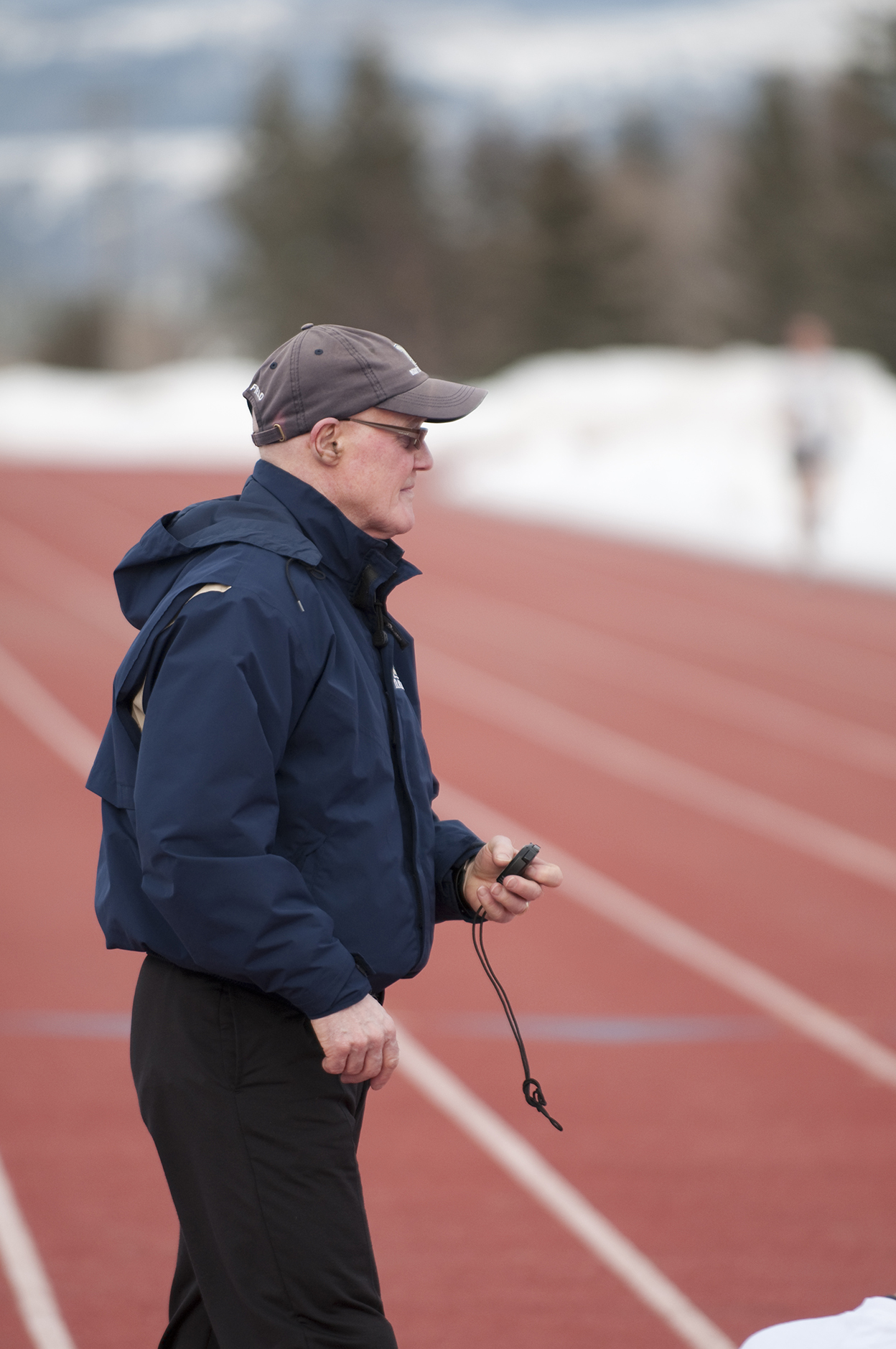
Dale Kennedy/ by Kelly Gorham, Montana State athletics
Kennedy’s influence can be measured in medals and trophies and banners and school records. But it can also be measured by his influence in forming the Bobcat Track & Field Association in 2000, an organization that has raise more than $8 million. Those funds have gone to the cutting edge Mondo-X track in the Brick and the Plaza Track project behind Bobcat Stadium..
“When we came in, the outdoor track had weeds,” said Tom Eitel, MSU’s jumps and multi-event coach since 1989. “It was a 440-yard track. The track slanted the wrong way. There was not much here. But Dale was here.”
And Kennedy’s influence can be found in the ethics and values he instilled in countless Montana State athletes.
“First of all, he was a good example himself,” Carignan said. “He gets up every morning and trains every day. He’s applying some of these things he reads about to his own regimen. I think that’s a real good example for athletes to have a coach who is doing it every day.”
When he graduated from Eastern Washington in 1968, Kennedy thought he would become a high school football coach while he taught history, biology and physical education. He coached high school sports for a decade, spreading his time between football, basketball, cross-country and track in small Washington high schools. In the meantime, he and his wife, Terry, welcomed two children, Kim and Patrick, to the family, both born in Chehalis, Washington.
Terry was a “national level” track competitor during the Kennedys first years of marriage. Her coach was part of the U.S. National team staff on 16 different occasions, Dale said. His wife’s athletic pursuits sparked Kennedy’s interest in the sport.
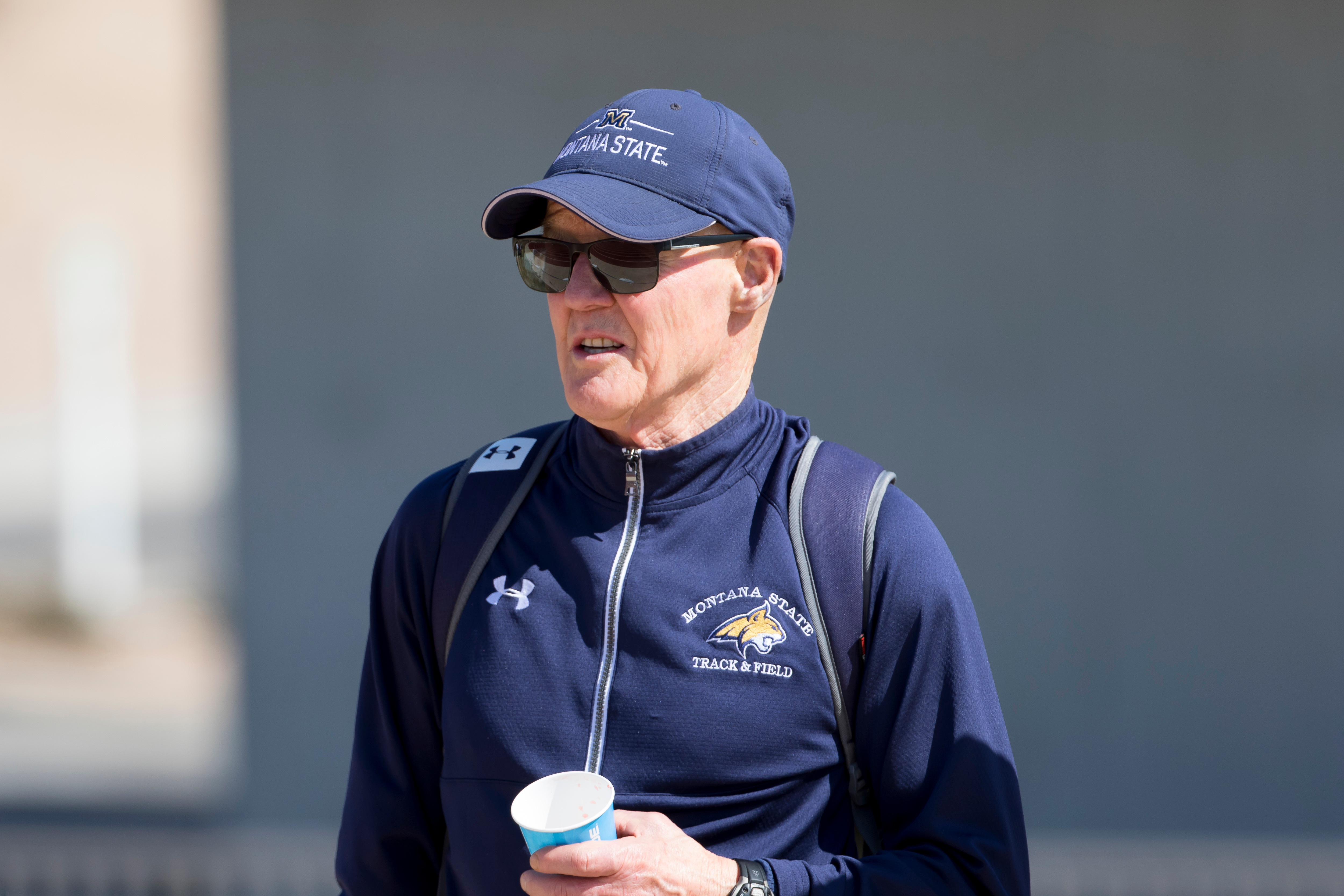
Montana State head track & field coach Dale Kennedy/ Courtesy of Mike Carignan, MSU athletics
“I think he thought I had some tools and I could coach so I got in the Olympic development program with him and we traveled six, seven weeks of summer putting on Olympic development camps all over the country,” Kennedy said. “He and Terry, I owe so much to them for getting me into the sport of coaching track and field.”
After spending a few years coaching at Central Valley in Spokane, Kennedy took over at Spokane CC, swiftly leading the women’s track team to three straight conference titles and four consecutive conference championships. But he wanted to coach athletes for four years.Pioneering MSU women’s athletic director Ginny Hunt hired Kennedy in 1981. Success came quickly. Following the Mountain West title two years later, the Kennedys decided Bozeman was the place they wanted to make their lives permanently.
“Terry and I looked at each other at dinner one night and I said, ‘You know what? This is a great place to live. This is a great place to work. We are not trying to go anywhere else,” Kennedy said. “We did not try to go anywhere else. We decided we would make Bozeman our home.”
“None of this would’ve been possible without Terry,” Kennedy added in his statement at his retirement press conference. “When you are a coach, it’s not quite 24/7, but it’s not damn far away from 24/7 if you are really into it. She’s put up with that for 50 years.”
Montana State’s women’s and men’s track programs operated independently of each other with Kennedy guiding the females and Rob Stark coaching the males. But Stark’s multiple sclerosis forced the programs to merge at the turn of the 21st century.
Over the last 18 years, Kennedy tried to maintain the successes the Bobcats experienced the previous two decades while continuing to emphasize personal growth, a priority on politeness and the cultivation of a team atmosphere within what most think is an individual sport.
“What I learned the most from him is there’s so much more to the sport than just running fast,” said Jaeger, who hails from Yakima but resides in Bozeman, teaching in Gallatin Gateway and coaching sprints at Bozeman High School. “That’s what I thought the sport was about: me as an individual competing. But when I was recruited, he made me feel wanted and he always emphasized being a part of a team. That was his big motivator as a coach: the team aspect of track and field. That pushed me farther when I was competing because that made me want to run farther not only for him but for my team.”
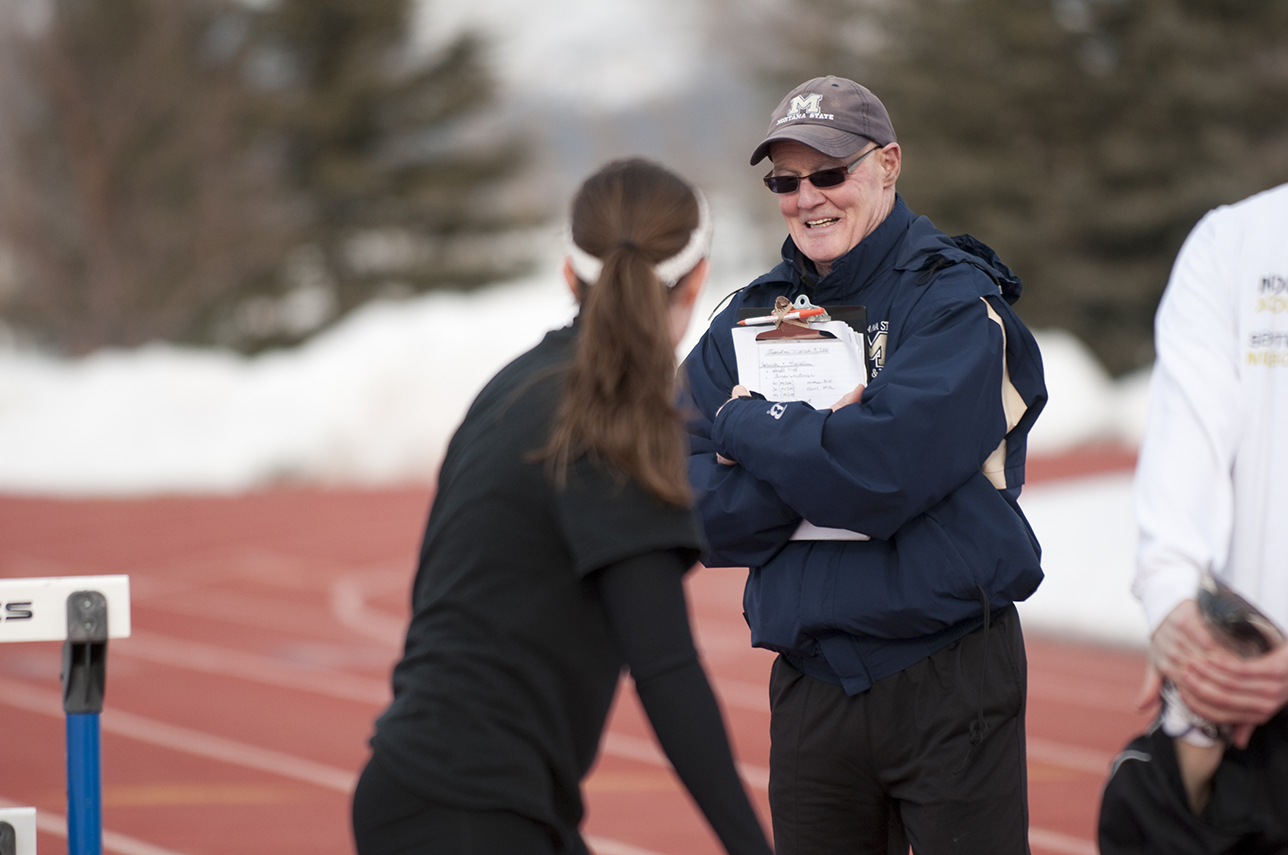
Dale Kennedy/ by Kelly Gorham, Montana State athletics
For a sport with so many facets — it’s a rare if impossible occurrence to see distance runners, sprinters, jumpers and throwers all together in the same area other than at track meets — Kennedy managed the pursuits a team sport. The Bobcats held team meetings, sharing their accomplishments after each race. Different disciplines were encouraged to root each other on. Kennedy made it a tradition for the entire team to gather for the finale of each meet, cheering on the 4×400 meter relay teams enthusiastically.
“For an individual sport such as track and field, Coach Kennedy had an amazing ability to create team pride and support across the groups,” said Jeff Rodenberg, a long hurdler and 4×400 team member who ran for MSU between 1996 and 2000. “He would encourage us to support our teammates during their events. In particular, he always rallied the entire team to cheer the final event (the 4×400 relay) as a group. There was a huge sense of team pride when the whole team was doing coordinated cheers. It made you run harder than you thought you could.”
“Coach K was able to show us that competing for one another was more important than competing for ourselves,” added Douglass, the last man to qualify for nationals with Kennedy at the helm. “He was constantly preaching love and care and very early on most athletes realized that they weren’t going anywhere if they weren’t doing things for the right reason. Being a team not individuals was always a big part of Montana State track and field.”
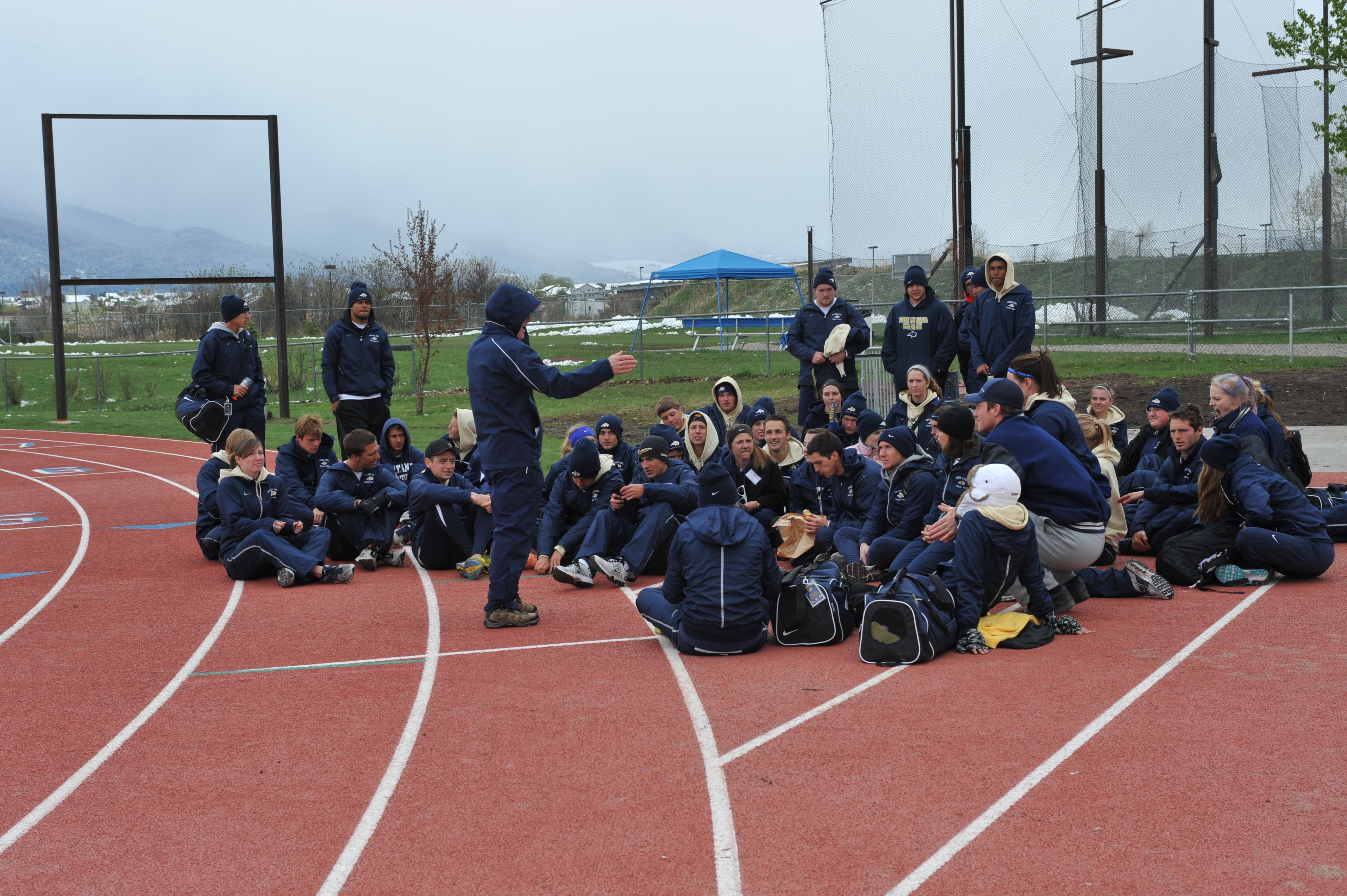
Dale Kennedy/ Courtesy of Mike Carignan, MSU athletics
Emphasizing a team element translated to the athletes but it was not the only organization Kennedy helped bring together. When Stark retired and Kennedy took over as the head man for all six programs, he knew he needed to create a group to help sustain and propel Bobcat track. The Bobcat Track & Field Association was born.
“It’s not just the money they’ve raised but it’s the passion and the support they have for our kids,” Kennedy said. “They have been really instrumental. When I came into coaching, I never knew fundraising would be a part of it. I realized there’s no way I could do it but maybe I could get a team that could do it together. We’ve got that done. We have outstanding track and field facilities.”
The Bozeman Track Club and the Bobcat Track & Field Association have both had huge influences in Bozeman’s growth into one of the most active running communities in the Rocky Mountain West.
“It’s really important to have connection with the community and to be accessible to the community,” Carignan said. “Anything we can do like that, he was very out there in public and liked to meet people and talk about involvement. It made a huge difference.
“The Bobcat Track & Field Association really jump-started us when Dale first took over and it wasn’t any coincidence that we started winning championships those first three or four years. We won championships in 2002, 2003 and 2005. It was exciting to have that support group. And it was Dale that was attending those meetings.”
 Carignan estimates Kennedy attended more than 200 meetings over the last 18 years, patiently listening and giving feedback despite not serving on the board.
Carignan estimates Kennedy attended more than 200 meetings over the last 18 years, patiently listening and giving feedback despite not serving on the board.
“We have a group of people that are real loyal to us and when you ask them why, they say the values,” Carignan said. “I’m really proud that we had those values on our team and I think they came from Coach Kennedy. “
Those values have led to more than 40 marriages between former MSU athletes, Carignan said. Those values include thanking judges and officials after meets. Those values include picking up all trash and refraining from using profanity during the heat of competition. Those values helped make the experience of competing for Kennedy a memorable one for those who did.
“We gave every individual we could the opportunity to grow and be as great as they could be but I wanted them to understand there was a family here and that if they would take an interest in their teammates, that interest would come back to them,” Kennedy said. “Within that, we developed a team culture, a camaraderie that was really special.
“It’s hard to even comprehend. I have lived the dream of my life.”
From his experience serving as an assistant coach for the U.S. women’s indoor track and field national team that competed in Budapest, Hungary in 1989 to his time as the regional coordinator for the U.S. Olympic Development Committee for Middle Distance/Distance Events to his role as the assistant director of Olympic Development camps from 1978 until 1990, Kennedy never stopped voraciously learning in order to teach the nuances of his passion to his pupils.
Kennedy is open about his disappointment for not winning more championships. But he’s also open about the pride he has for the steadfast consistency his program showed over the last 37 years. The program has “always thrived off Montana kids”, he said, acknowledging his priority on recruiting in-state athletes and developing them into national level competitors. The pillar of Montana State athletics knows he will always be involved in Bobcat athletics. But replacing a figure who personifies such stability is unlikely.
“He’s told me many times that he decided early in life that he might not be the best and the brightest but that nobody was going to outwork him,” Carignan said. “I don’t think we will truly know until he’s gone how much he was involved with everything and what sort of impact that’s going to have. I’m sure the next person will step up. But his biggest thing is his unwavering work ethic. It’s unmatched. That will be impossible to replace.”
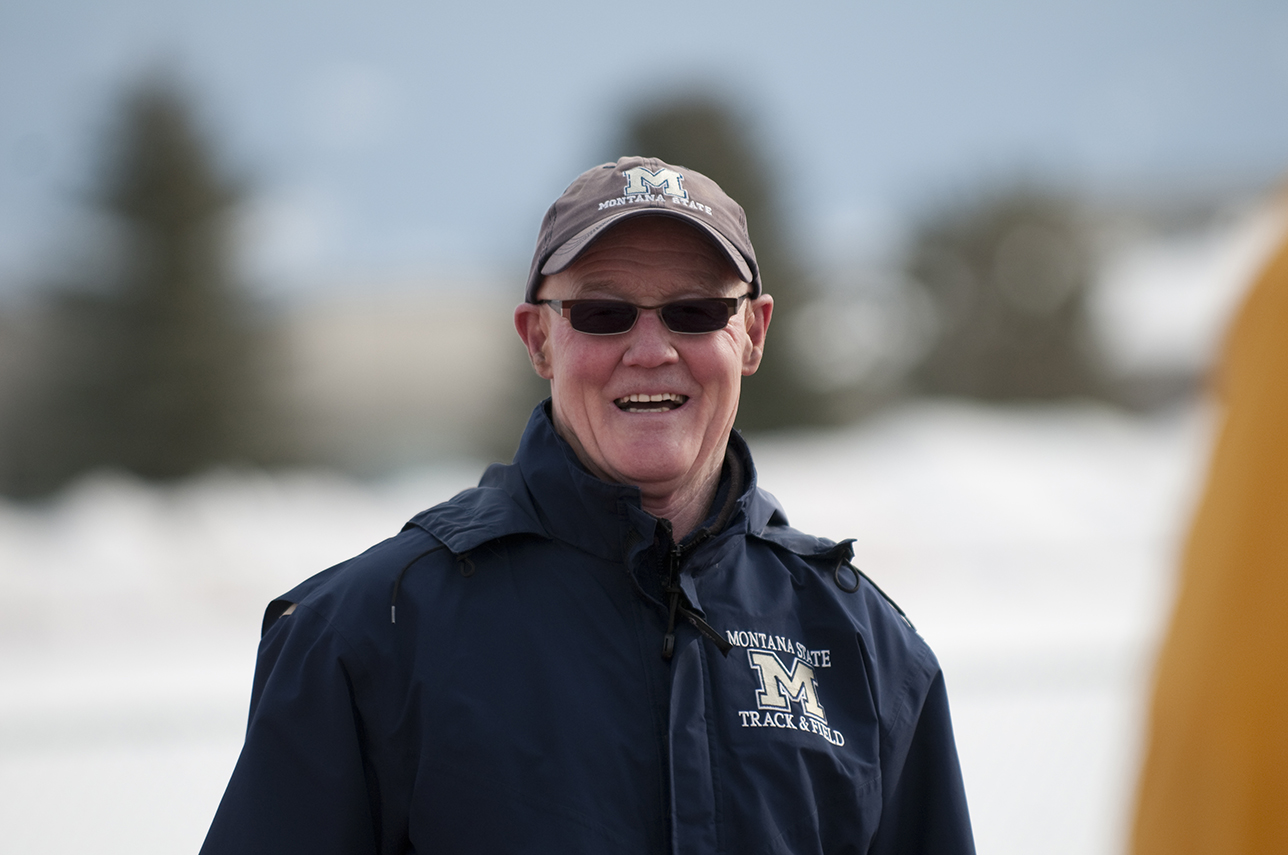
Dale Kennedy/ by Kelly Gorham, Montana State athletics
Photos courtesy of Montana State athletics or by Brooks Nuanez. All Rights Reserved.

